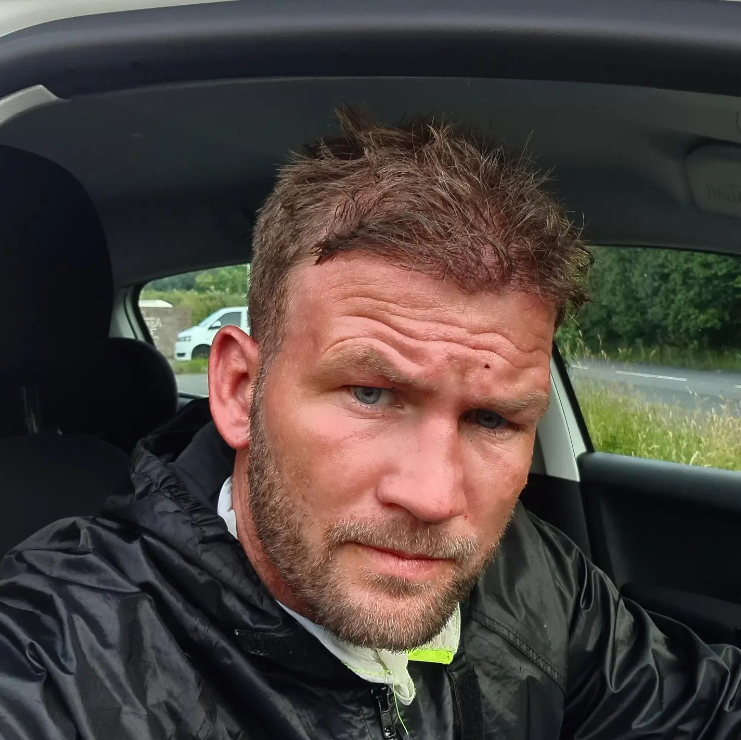
On 19 April 1986, Robin Deakin entered this world at Crawley Hospital. Born perilously premature, he clung on to life defiantly, a tiny scrap of humanity refusing to give in. As if the odds weren’t already stacked high enough against him, Robin was destined to contend with a crippling deformity which rendered him unable to walk unaided throughout his childhood. He grew up in a home environment which functioned in a perpetual state of conflict and, during his formative years, he spent more time inside hospitals than out of them.
Now in his late thirties, Robin’s personality is warm and endearing, laced with a disarming element of traditional courtesy. However, he has a complex and somewhat enigmatic side to his nature. In many ways, he comes across as calm and extremely clued up, and then, in the blink of an eye, he could make a casual remark to reveal an astonishing disregard for his own physical well-being. There is definitely something of the little boy about him, playful and open, although sometimes he projects an air of cynicism that makes him sound older than his years.
“I forget exactly how many weeks premature I was, but they didn’t think I was gonna survive. I’ve got a bad left clubfoot, real bad. My right one’s club, but it’s not as bad as my left one. The doctors were saying that I’d never be able to walk. I don’t know the exact number of operations I had, but I spent my childhood in Carshalton Hospital. That was basically school for me, if you like.”
“My dad was a hard, hard man. He was a bit of a boy back in the day. He had a reputation. He wasn’t kind to my mum, and my mum wasn’t kind to him. They weren’t made for each other really. Then my mum ran away from my dad, and my dad got the hump about it. He couldn’t find out where we were, so he went to our social worker’s office and dangled him out the window to try and make him tell my dad where we were, but the social worker wouldn’t tell him. It was breaking news on the telly. I don’t remember it because I was too young at the time, but everyone used to always talk about it. So he was definitely a bit of a violent man, my dad. I’m glad that my mum and my dad did meet because obviously they had me, but, like I say, they weren’t meant to be, and it was hard growing up trying to fit in, which is probably one reason why I took up boxing because I wanted to be loved for something that I was trying to be good at.”
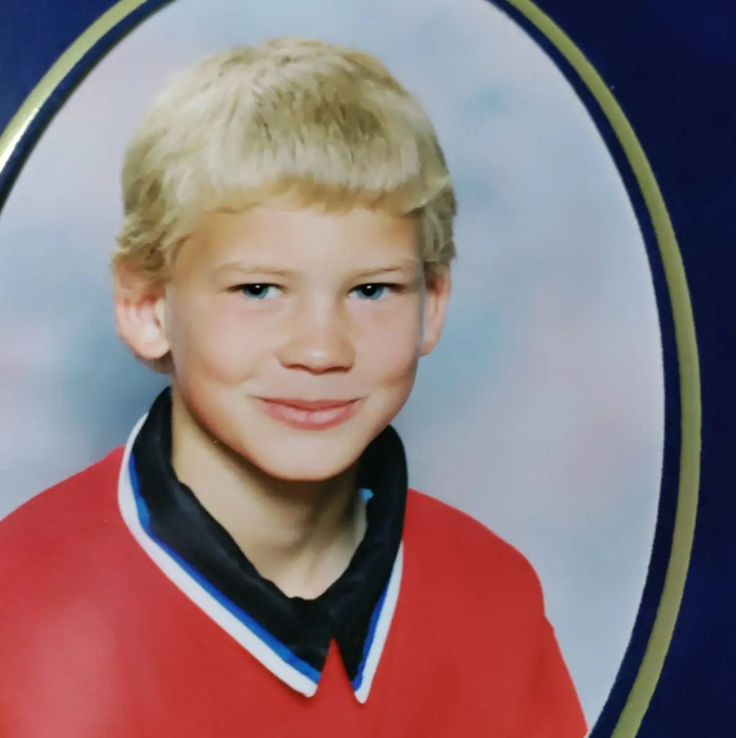
“I was a shy kid. I had no confidence and I didn’t like people. Even now, I’m very, very wary of people. It takes me a lot to sort of like someone and to let them in. I was about seven years old when my dad started taking me down Horsham Amateur Boxing Club with my bigger brother, Daniel, who never went pro, but he was a very, very good fighter as an amateur. I used to go down the gym on one of those frame things that old people have. I couldn’t walk, but I could stand holding that and punch with my left hand.”
As a result of prolonged and torturous physiotherapy, Robin eventually began to take tiny steps on his own. His dogged determination prompted his boxing coaches to shake their heads in amazement as he persevered to the point of basic dexterity and, gradually, the training helped to strengthen his legs and boost his confidence. Whereas thousands of fit and perfectly able-bodied lads walk into boxing clubs all over the country every week, many of them never reach the level where they will actively compete, so the fact that Robin became a carded boxer was a phenomenal achievement in itself.
“My first fight was against a guy called Craig Clark. He was from Crawley. I lost to him on points the first time and then we boxed again on a dinner show and I beat him. I boxed for Crawley boxing club as well as Horsham. Putting the two cards together, I probably had about 80-odd fights for both clubs. I won over half, I’d say probably about 50-odd.”
Robin pursued his amateur journey to championship status, and there was nothing boastful about his demeanour as he explained “I boxed in the ABA’s at 57kg. I reached the national semi-finals and I lost to Gary Sykes. Everyone was raving about Gary Sykes. I was in the same dressing room as him and it was in Cleckheaton [Sykes’ hometown] and he was England number one at the time. I gave him a good fight up to the third round and then they stopped it because there was a 20 point barrier and he got 20 points ahead. I’ve never really been good with defence and Gary Sykes just outpointed me, but I gave it all I could and, yeah, he beat me. But, there again, I’ve been in with a someone that ended up beating Anthony Crolla as a pro and Gary Sykes went on to win the British title and Anthony Crolla went on to win a world title. I still speak to Gary, even now. He’s a lovely guy.”
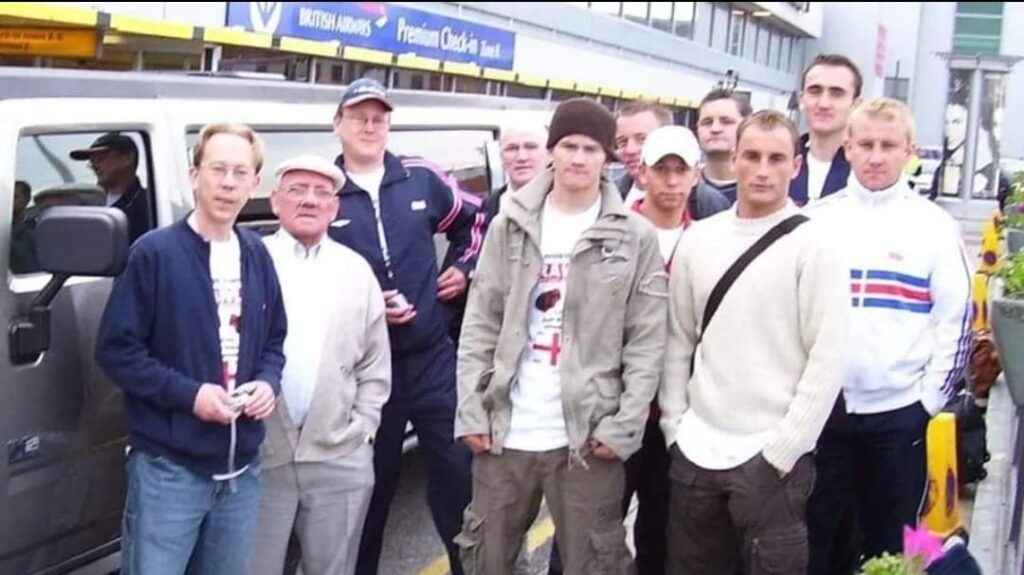
“I didn’t really travel much as an amateur because I wasn’t picked for the England squad. I represented England in the Limassol Cup in Cyprus, but that was for my club. The Limassol Cup was a great experience and I won a silver medal over there. In the final, I boxed a guy called Michael Blackburn from Scotland. I never actually knew what happened to him. I think he was Scotland number one at the time and everyone was raving about him and, when I got drawn up against him, everyone was like ‘Oh, you’re gonna get stopped’ and, to be honest with you, I did get stopped, but it was very, very hot Limassol and the heat just got to me. Every fighter will say this, and I’ll say it as well. It was a premature stoppage, but I understand why the referee stopped it because it was a combination of a left-right, left hook and it caught me and I didn’t go down, but I went back on to the ropes and the referee just basically waved it off.”
“Apart from boxing in Limassol, I boxed in Guernsey and Jersey. In Jersey, I boxed a guy called Ben Murray. Jersey is a small place and Ben Murray was a big name out there because his dad owned a business and they were a massive family. I knew I was never gonna get the win out in Jersey, so I just went out there and took the piss out of Ben Murray, sticking my tongue out at him and blowing kisses at his girlfriend. Steve Collins was over there sitting at the ringside, and I was blowing kisses at Steve Collins. Ben Murray couldn’t really hit me because my head movement was real good as an amateur.”
“After my fight with Ben Murray, I was talking to Steve Collins. When I told him what I’d been through, he told me that he couldn’t believe how good I was. He said ‘We’ll keep in touch’ and I just thought, yeah, whatever, it’s just another pro that’s had a few to drink telling me we’ll keep in touch. But, after coming back from the Limassol Cup, I had a random text from Steve saying ‘I want to meet you and take you to Frank Warren.’ I was at work at the time, only working behind a bar, but I was buzzing, jumping around and everything. So the day come and I met Steve at St Albans train station. He come and picked me up. We went to Frank Warren’s office and Steve got me a deal with Frank Warren.”
Robin made his professional debut at York Hall in October 2006 against Shaun Walton, a journeyman who fought out of Telford and went by the ring-name of “Slasher”. “I signed a three-year deal with Frank. I had my first fight and I won against Shaun Walton. I didn’t box my best. I think I won 39-37. But was a massive thing for me and, if I’m going to be honest, it got to my head. Being with Frank Warren, I thought he was sort of like my shield and I wanted to take on the world.”
It was nearly four months later when Robin got the call for his next fight, which was against a Latvian opponent called Eduards Krauklis at Wembley Arena, and it was a far cry from the frenetic atmosphere of his debut at York Hall. “My second fight was a late notice fight. Dean Powell phoned me up and he said ‘Are you back in the gym?’ I said ‘I am, but I’m not really doing much. I’m just eating what I like and ticking over.’ He said ‘Right, you can fight at Wembley Arena. I can get you on the undercard of Michael Sprott and Audley Harrison.’ So I said ‘Yeah, wicked, do that.’ I sold like £5,000 or £6,000 worth of tickets and I got put on the first fight. There was no one in the arena. I’m not too sure, but I think it was just before the doors opened and not a lot of my friends were in there, the people who had bought tickets, and I was wondering why. It was so different to my debut. The place was just bare, so I sort of froze a little bit. I still thought I won the fight, but I ended up losing by a point. It wasn’t me because I’ve always been a showman, the arena was echoing and I was thinking ‘Frank’s not even here. Who am I trying to impress? What’s the point?’ So I ended up losing and then, when I lost, it all went downhill, so I rang Dean Powell and I said ‘Dean, I want my contract back’ and he said ‘Okay, I’ll talk to Frank’ and, within about three months, I ended up getting my contract back from Frank.
The loss the Latvian turned out to be the first of 51 consecutive defeats for Robin and, from this point onward, he trod the tough road of a fighter who looks after his own affairs, taking his chances and trusting a friend whenever he could find one. “Graham Earl managed me for a bit. At the time I signed with Graham, he hadn’t long had the first fight with Michael Katsidis and everyone was raving about how good that fight was, so I thought signing with Graham would boost me a little bit more and try and get me another step into something big. I was with Graham for a couple of years and Graham was good. He wouldn’t take 25 per cent. He’d take 10 per cent, and he done it to get me fights and get me out there. Graham would say ‘I’ve got you a fight’ and I’d be straight on Google having a look and I’d say ‘Take it. I think I could beat him.’ I never cared who I was fighting.”
Robin’s record is peppered with looked after and unbeaten fighters. For his fourth fight, he travelled to Irvine in Scotland to box Swansea southpaw, Ricky Owen, and he was stopped in the second round for his trouble. “The thing is with me, I always go by the face, so I Googled Ricky Owen, I see his face and I thought he’s a fucking pansy! I thought I could beat him, so I said ‘Yeah, fuck it, I’ll take it, Graham.’ Graham said ‘Are you sure? It’s tomorrow.’ I said ‘Yeah, I’ll take it.’ I remember I had to weigh 8 stone, 12. So I said ‘I’ll go to the gym and sauna now.’ Graham got it booked and I flew out to Scotland. I lost the weight and drained my body, and Ricky Owen was a very, very good kid. I didn’t do my research. He was Welsh ABA champion. He boxed for Wales and he was very strong. He was one of the strongest I ever boxed.”
Although Robin’s course had rapidly become firmly set on the losing side of the scorecards, the fact that he always wanted to put his heart and soul into his performances regularly won him the respect of the crowds. “When I boxed Ryan Walsh the first time, it was on the undercard of David Haye v Enzo Maccarinelli at the O2 and there was 15,000 people there. I was booed coming in, but, going out, I was cheered because we got ‘Fight of the Night’ on the undercard and it was amazing. I had a great war with Ryan Walsh. Whenever I was fighting, it would always be exciting, and my dad was always with me. My dad was always there throughout my career, amateur and pro. His name is Lester and he’s like my best friend. He’s always been by my side.”
Robin has always maintained that Anthony Crolla and Stephen Smith were the hardest hitters he ever faced, and he stepped into the lion’s den to box both in their respective hometowns. He boxed Crolla at the MEN Arena in September 2008. Robin was under no illusions that he stood a real chance of beating the ‘Million Dollar’ Mancunian, but he was happy that he went the distance with the future British and world lightweight champion.
“With Anthony, I sort of called him out, if you like, but I like Anthony. He’s a good friend. He turned pro when I turned pro. We both signed with Frank Warren. We were always talking on the phone before we fought each other. Then, when I called him out, we didn’t fall out, but I think he was in fighting mode, so he was ignoring me. The weigh-in was at the Arndale shopping centre and I said to him ‘Look, I’ve been offered good money and I’m taking the fight for the money. I know I’m not gonna beat you.’ All his fans were shouting ‘Deakin is a wanker!’ and who cares? I know I’m a wanker! The crowd never, ever bothered me because I love being the underdog. I love people saying ‘You’re gonna lose.’ Yeah, so what? It doesn’t faze me at all. In life, I’ve learned to deal with a lot worse than fucking people shouting abuse. I’m not scared of no man. On the street, in the ring, I’ll fight anyone. You live life once basically and you’ve gotta enjoy every moment, so I just enjoyed every moment whether I was booed or what.”
Just over four weeks after his fight with Anthony Crolla, having squeezed in another two fights in between, Robin took himself to Stephen Smith’s native manner to do the honours with the future British & Commonwealth champion at the Everton Park Sports Centre.
“Stephen is a lovely guy. I love him to bits. I love all the family. They’re lovely people. Stephen stopped me in the second round with a body shot, and he can whack! I can still feel it now! But I wanted to be in with the best, to say that they’ve been on my CV, to say ‘Yeah, I’ve been in with them.’ I knew I’d never be a world champion, but at least I could say I’ve been in with world champions and world champion challengers, boxing the best so I can say I’ve been in with them.”
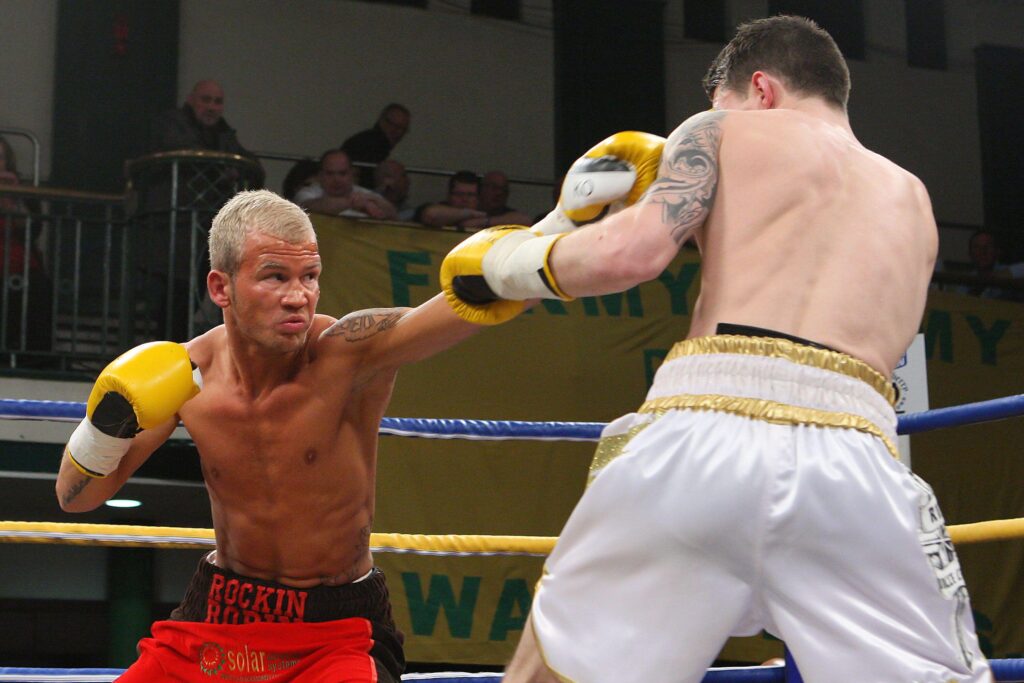
In January 2012, Robin had a typically dramatic battle with Ryan “The Bomb” Taylor at York Hall. Taylor put Robin down in the first round. Then Robin put the Londoner down with a peach of a right hand in the second. In the third, Taylor floored Robin with a body shot and it was game over. Robin had characteristically gone out on his shield and he’d been happy with his performance that night. “That was a good fight, that was. I give him a bit of a war, to be fair. I took him to the trenches and I give him a good go. It was on the undercard of Carl Frampton defending his Commonwealth title, but afterwards it was me and Ryan Taylor that everyone was talking about.”
Robin says that, after the Ryan Taylor fight, he was summoned to the office of the British Boxing Board of Control for a meeting during which he was told that he should be fighting like a journeyman rather than coming out “all guns blazing”. Robin flatly refused to change his game, and he strongly believes that it was his adamance that caused the Board to revoke his licence. When the news reached him that they were taking his licence away, he was devastated.
Back at the beginning of his pro career, when Robin found that overnight he had switched from the status of prospect to the guy in the losing corner, he was quick to understand what was happening, but the thing with him was that, rather than play it relatively safe and have a move-about in the workmanlike manner of a traditional journeyman, which he would have been perfectly capable of doing, Robin always wanted a tear up. There was undoubtedly something masochistic about his fighting style and it could easily be thought that he needed saving from himself. However, the way Robin saw it, he had served his purpose in boxing. He declared that he had never been knocked momentarily unconscious and, whereas it cannot be denied that there had been times when he’d taken many fights condensed into a short time period, the Board had allowed this status quo to continue throughout his career. He reasoned that, if the Board were so concerned about his welfare, what had taken them so long to do something about it?
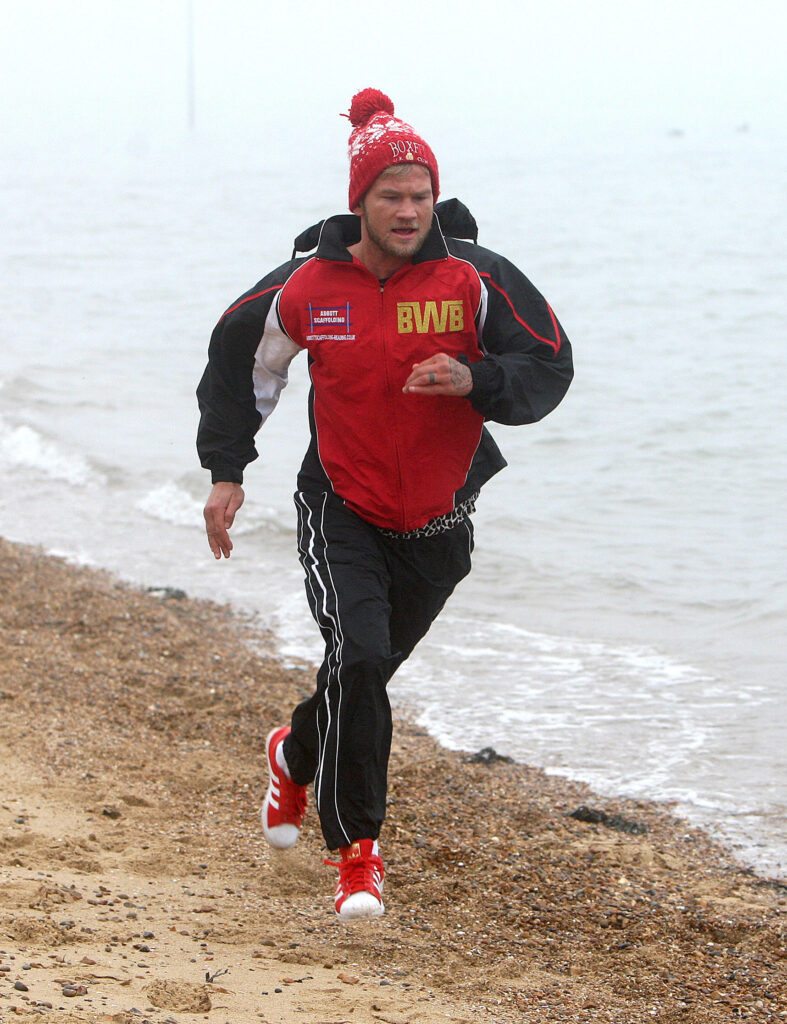
Determined to continue boxing, Robin had his final handful of fights under the jurisdiction of various foreign boxing commissions. At this stage of the game, he linked up with a genuine boxing man named Dave Murphy, who Robin describes as “a good and loyal manager”. It was on one of Dave’s shows, licensed by the Maltese Boxing Commission, that Robin finally accomplished his first win since his professional debut almost nine years earlier, winning on points against a Latvian called Deniss Kornilovs.
“I phoned Michael Jennings and I asked him to train me for this fight and he agreed. I was homeless at the time, so I went to Manchester and moved into Michael’s house. I lived in his cinema room for a few months. I loved that time in my life. Getting trained by Michael and his brother, David, was brilliant. We worked hard every single day and I was in great shape. I love the Jennings family. They’re like my own. When I won, obviously we all went mental and then I started crying at the end. It was a relief to think ‘Fucking hell, I’ve done it!’ But it was a bit surreal. I thought I was dreaming.”
The above-mentioned Dave Murphy was kind enough to let me interview him for this piece. Dave’s aim as a manager/promoter was to provide fighters with an alternative to the Board of Control and he lost thousands of pounds of his own money in the process, as he explained “I’ve spent my whole life in boxing, and the pro game is a hard old game. It’s not like the amateurs, which I loved with a passion. It’s a cut-throat world out there and everyone will have you over.”
“I manged Robin for a very short while. He’d had 50 fights when I first met him. I got chatting with him and he was looking for help, so obviously I offered it. His first fight with me was on one of my shows at York Hall when he boxed Damian Lawniczak. Damian was tough, but he was a scrapper and not a boxer, so I said to Robin ‘Just box him. Here’s your chance for a win.’ I spent time in the gym with Robin, trying to get him out of his journeyman attitude, because he’d just stand there and wait to be hit and then he’d turn it into a fight which he couldn’t win because his movement wasn’t as good as some of the other lads. But, if he got off the back of his jab and boxed, he could actually win a fight. I wanted to do his corner so I could have kept him calm and talked him through it. On the day before the show, my wife got rushed into hospital and I didn’t make it to the show and apparently Robin got involved in a fight and just got outpointed.”
“My wife was in a coma for six weeks from that night. We’d both come back from India with a cold. Mine went. Hers didn’t. It got worse and worse. We took her to the hospital and, about 7 in the morning, I went home. I got all the stuff ready for the show and then I got a call that she’d stopped breathing, so I shot back up the hospital and I spent about a month in the hospital with her and she’s never been the same since, but we’ve worked through it. I done a few more shows after that, but my heart wasn’t there anymore. I put Robin on a Malta Boxing Commission show where he got the win against Deniss Kornilovs, and then I don’t think I ever saw him again. I spoke to him a long time after and he was talking about going bare-knuckle and stuff.”
“What you’ve gotta know about Robin is he was as game as anything. I mean, he would fight absolutely anyone. I mean, he had no fear whatsoever. I’ve met a few people like him in the past and he really had a lot going for him, but he just couldn’t seem to get it together and box properly. He really did have abilities, but I think he’d just been used and abused and he couldn’t get it out of his system. They all went in the press ‘The worst boxer in Britain’ and there was no way he was the worst boxer. He just needed the opportunities. Anyway, whatever he does, I wish him all the best.”
Robin had his final two gloved fights in 2017 in Spain, where he got stopped in the second and third rounds respectively. The Spanish connection came about when he happened across an agent on social media. At the time of our interview, Robin couldn’t remember his name. “I got in touch with this fella on Facebook, who’s a promoter or manager. He’s Bulgarian or something. I said ‘Get me some fights’ and he said ‘Yeah, okay, I’ll get you a Czech licence and I’ll get you some fights in Spain,’ so I went to Czech and I got a Czech licence. My first fight in Spain was against Alin Florin Ciorceri and I lost to him, and I come back and I had a word with the agent and he said ‘You’ve gotta go in there a bit more aggressive. You can’t keep just going in for money.’ To be honest, the money was shit anyway. It was like €400 or €500. But I said ‘All right then’ and he got me another fight.”
“So that’s when I boxed on a Spanish card again against another guy, Diego Valtierra. I went to Spain all on my own. I had no trainer and no manager, and I didn’t speak a word of Spanish. I just had an agent I’d never even met. They paid my expenses, my flight and my accommodation, but I didn’t know anyone out there. I made a lot of press and it was on their TV out in Spain and it was massive. I thought ‘Fuck it, it’s probably gonna be my last fight,’ so I got in his face at the weigh-in. Then, walking out on to the ring, I was like a celeb. It was mad! They were cheering me when I was going in and cheering me going out. It was lovely boxing out in Spain. It was a great experience, an experience that I could never forget, to say thank you to boxing for giving me the character and the push to go and do something, because there’s not many people – able bodied people – who can turn round and say they’ve done this, they’ve done that. I’m in a disabled body and I can say I’ve done more than most people could ever dream of doing.”
Just over a year after his final professional boxing match, Robin returned to the ring for a handful of bare-knuckle fights, which spanned from 2018 to 2022. He drew one and lost the rest. On the face of it, these events are well organised with plenty of razzamatazz, but, to my mind, bare-knuckle fighting is the pitiless distant cousin of the noble art and, when we reached this stage of his story, I had one simple question for Robin. Why?
“Why?” he echoed, before continuing “Because I like fighting. I know I haven’t got the body to be a fighting man because of my legs, but there’s one thing you can’t buy and you can’t train for, and that’s heart and I’ve got the biggest heart out there. I love getting hit. I’ve aways had a good pain threshold. Because I’ve lived with pain for so long, that’s all I’ve ever known. So I did bare-knuckle to prove my point. I’ll fight anyone. Let’s go. For my last one, I got two grand plus I got my hotel paid for, which was 500 quid. So, if you like, I got two and a half grand for a fight basically. Obviously, no money’s worth ending a life for and anything can happen in bare-knuckle, but I don’t regret doing it. I wouldn’t change anything I’ve done, but now I’d definitely never want to change what I have.”
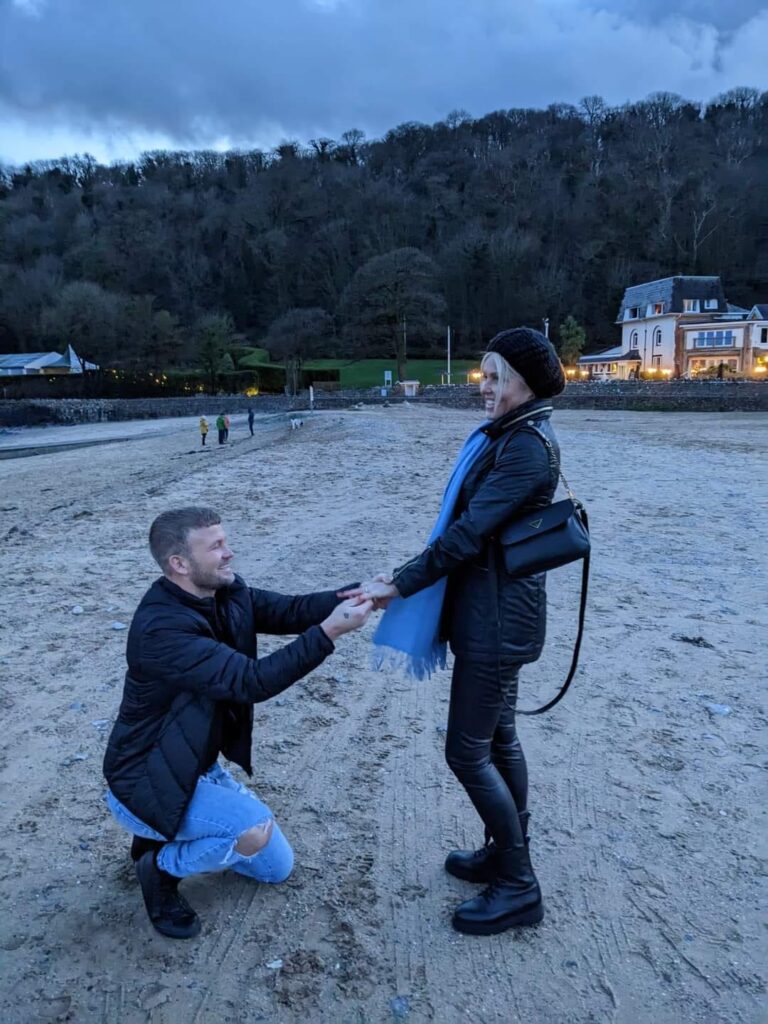
“I met a wonderful lady who is now my fiancé. Her name is Kristy and I found her at the end of my fighting career. She changed my life basically. She’s Welsh and we live in Wales. We’ve got a lot in common. Kristy is my best friend. I know it’s a cliché. Everyone says that, but she’s so hardworking and she inspires me to go to work and forget the boxing. She’s the best. She’s beautiful. I wanted to find love, and I found love. Kristy said ‘Don’t fight’, so I’m not fighting because of love, although I will never let no man hurt Kristy or her family. As far as I’m concerned, my job now is to keep them safe. Kristy has kept me sane. I’m happy with my life and I cherish every minute we spend together, because every day is different and no one knows what’s round the corner.”
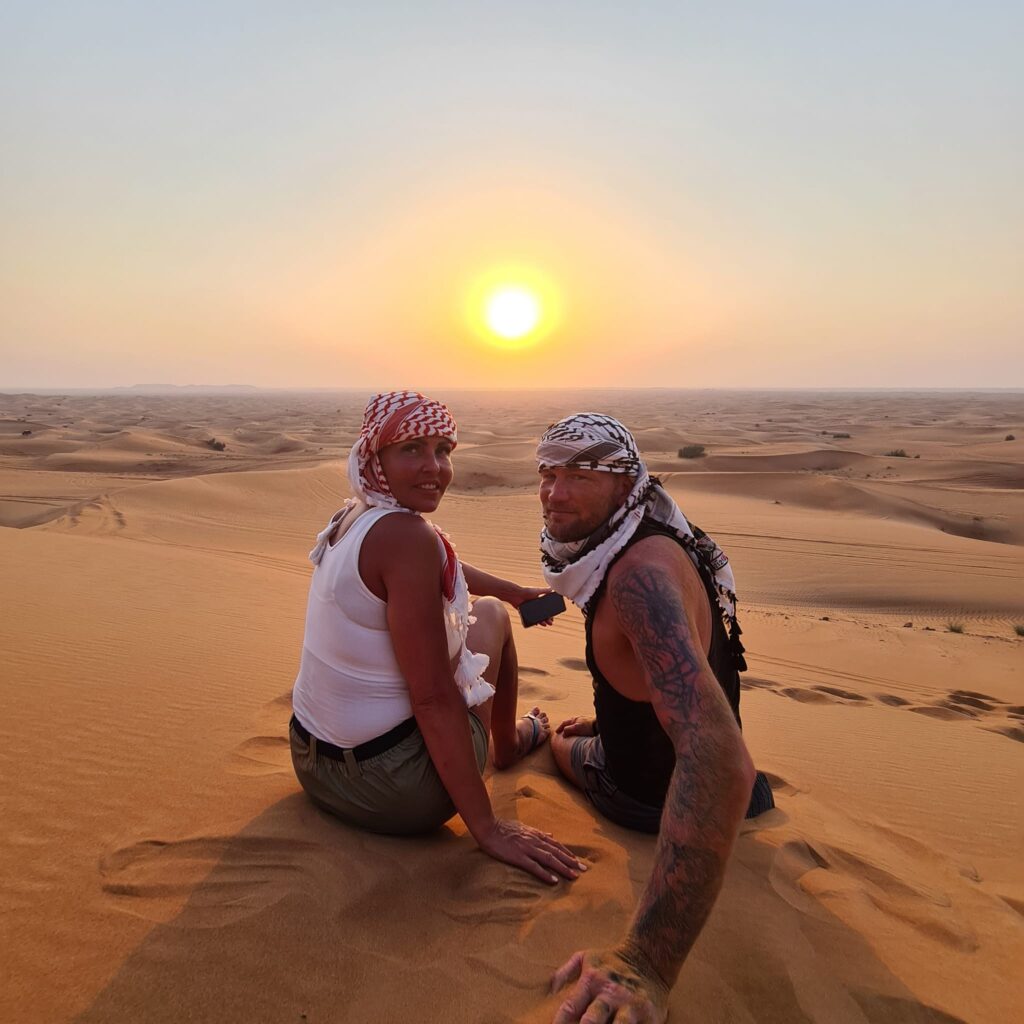
***
For various reasons, this article took a long time to complete. In April 2024, almost a year after we did the interview, Robin took part in an exhibition match against former opponent, Ben Day, to raise funds for the Ringtone Boxing Gym which is run by Ben and situated in Drummond Street, London.
Finally, Robin wishes to take this opportunity to say “Thanks to Mick Collier and Les Potts from the Board of Control for everything they’ve done for me, for saving my life.”